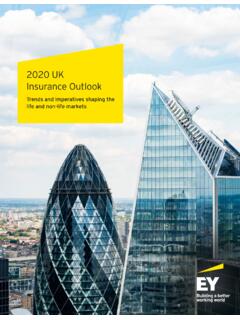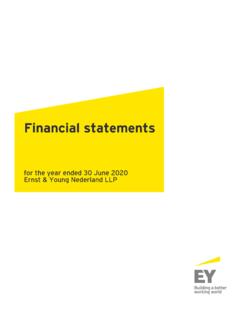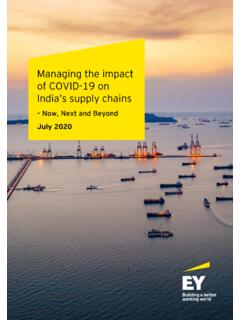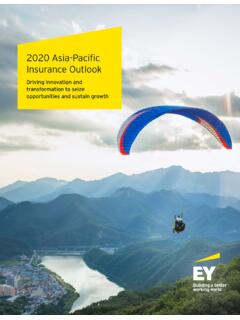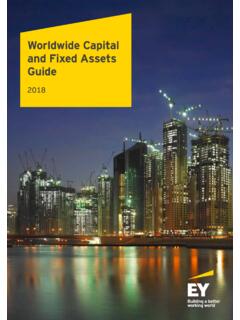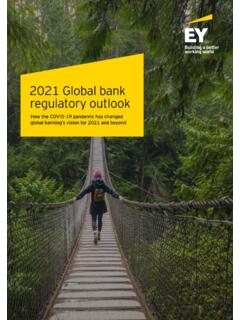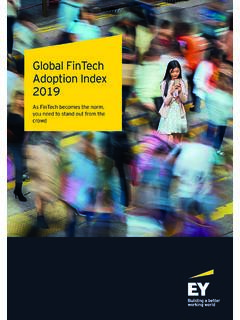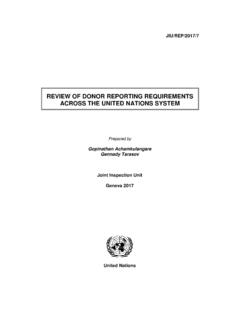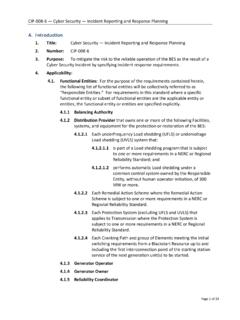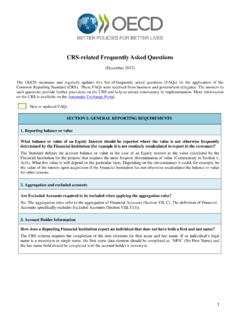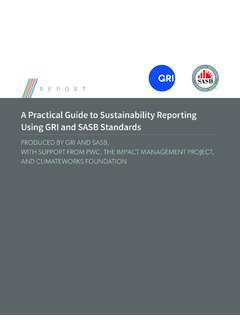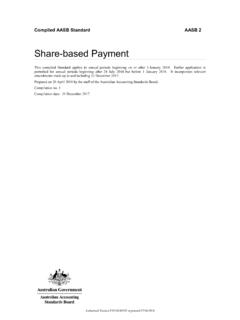Transcription of The future of sustainability reporting standards
1 The future of sustainability reporting standardsThe policy evolution and the actions companies can take todayJune 2021 Foreword2 Introduction3 State of play: sources of influence6 Global variations in managing sustainability -related disclosures8 Global standards outlook: through a macro lens 13 Recommendations for companies18 Abbreviations21 Lead authors22 Contributors23 Contacts25 About this report26 Endnotes27 Contents2 The future of sustainability reporting standards |ForewordThe shared global experience of the past year has illustrated the interconnectedness of our world, our vulnerability to the environment and the impact of global action.
2 Public health, climate change, social inequality, diversity and inclusiveness are challenges that need global attention and innovative, collaborative solutions. We also need a common language to measure and report on society s progress and for the global economy to price externalities such as greenhouse gas emissions and environmental damage, allocate capital and make better decisionsOver the last 18 months, significant progress has been made toward establishing global sustainability reporting standards . The future of sustainability reporting standards analyzes this progress across both developed and developing markets and recommends actions companies can take now to navigate and prepare for emerging sustainability reporting mandates.
3 The most promising development is the expected launch of the International Financial reporting standards (IFRS) Foundation s International sustainability Standard Board (ISSB) at COP26 in November. As the body that sets accounting standards in much of the world, the IFRS Foundation is well positioned to introduce the discipline that exists in financial reporting into sustainability reporting , building on the linkage between the various standards while respecting their different strongly support the IFRS Foundation s proposed creation of the ISSB and the development of robust, globally consistent sustainability reporting standards .
4 At the same time, we support efforts within the European Union, United States and other jurisdictions to develop regional standards that respond to local stakeholder needs and expectations. Like the IFRS Foundation, we recognize the need to instill regional flexibility alongside a global next 12 18 months are an opportunity for action and will likely result in developments that represent one of the most significant innovations in corporate accounting and reporting in decades. Many businesses are preparing for future sustainability disclosures and committing to transparency and accountability before they are mandated.
5 Now is the time for companies and their leaders to work together with regulators and civil society to achieve consistent, global standards and contribute to this critical process that will help define corporate reporting and accountability for the next Di SibioEY Global Chairman and CEOR uchi Bhowmik EY Global Vice Chair, Public Policy3 The future of sustainability reporting standards |Section titleIntroductionThe number of environmental, social and corporate governance (ESG) regulations and standards globally has nearly doubled in the last five years. Accompanying this rise are various reporting frameworks led by the Group of Five standard setting In addition, there are currently over 600 ESG reporting provisions globally, with many having differing interpretations of areas of scopeESG standards generally encompass the following.
6 Environmental, , waste management, emissions impact, energy efficiency, air and water pollution, environmental protection, and biodiversity loss and restorationSocial, , human rights, labor rights, working conditions, health and safety, employee relations, employment equity, gender diversity and pay gaps, anti-corruption, and impact on local communitiesGovernance, , ownership and structural transparency, shareholder rights, board of directors independence and oversight, diversity, data transparency, business ethics, and executive compensation aim is that these standards help companies to better measure and manage their exposures to ESG-related risks and to become better corporate citizens by measuring, disclosing and managing the environmental and social impacts they future of sustainability reporting standards |IntroductionThe high number of guidelines about what ESG information is required or recommended to be disclosed means companies face barriers and strained resource capacities to focus on quality ESG disclosures.
7 For instance, publicly listed companies have to abide by mandatory financial and nonfinancial2 disclosure requirements issued by regulators and stock exchanges. Companies must also respond to varying requests for voluntary disclosures and assessment processes set by ratings providers as the broader investment community and shareholders are calling on companies to provide greater transparency around sustainability risks. As a result of these different processes and requirements, there are often significant variations in the information disclosed about a company s ESG performance.
8 It is thus not surprising that there is a disconnect between the increased focus on evaluating ESG performance from investors and the availability and efficacy of standardized nonfinancial data provided by 1: Voluntary and mandatory ESG reporting provisions Totals by yearNumber of ESG reporting provisions by region, 2020 North America20162020 South AmericaAfrica and Middle EastAsia-PacificEuropeSource: Van der Lugt, C. T., P. P. van de Wijs, & D. Petrovics. (2020). Carrots & Sticks 2020 - sustainability reporting policy: Global trends in disclosure as the ESG agenda goes mainstream.
9 Global reporting Initiative (GRI) and the University of Stellenbosch Business School (USB). Available at: Voluntary Mandatory5 The future of sustainability reporting standards |IntroductionGrowing momentumGiven the lack of consensus over what reporting information is required and the need for comparability across and within jurisdictions, there has been a growing momentum towards a global harmonization of sustainability -related financial reporting standards in the last 18 months. The most promising development is the IFRS Foundation s ISSB, set to launch at COP26 in November 2021.
10 Building on existing frameworks and endorsed by the Group of Five, the World Economic Forum International Business Council (WEF IBC) and the International Organization of Securities Commissions (IOSCO), the ISSB will be tasked with developing and maintaining global sustainability -related financial reporting standards that are relevant to enterprise value. The IFRS Foundation s extensive consultation with stakeholders has concluded that there is an urgent need to accelerate the establishment of a high-quality, global, sustainability -related financial reporting In their 5 June communique, the G7 Finance Ministers and Central Bank Governors expressed support for the ISSB and called for mandatory climate-related financial disclosures based on the Task Force on Climate-related Financial Disclosures (TCFD) framework.
